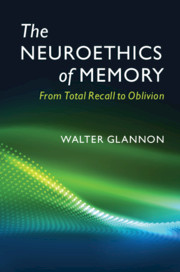Book contents
- The Neuroethics of Memory
- The Neuroethics of Memory
- Copyright page
- Dedication
- Contents
- Figures
- Acknowledgments
- Introduction
- 1 Memory Systems and Memory Stages
- 2 Agency, Identity and Dementia
- 3 Anesthesia, Amnesia and Recall
- 4 Disorders of Memory Content and Interventions
- 5 Disorders of Memory Capacity and Interventions
- 6 Legal Issues Involving Memory
- Epilogue
- References
- Index
4 - Disorders of Memory Content and Interventions
Published online by Cambridge University Press: 18 July 2019
- The Neuroethics of Memory
- The Neuroethics of Memory
- Copyright page
- Dedication
- Contents
- Figures
- Acknowledgments
- Introduction
- 1 Memory Systems and Memory Stages
- 2 Agency, Identity and Dementia
- 3 Anesthesia, Amnesia and Recall
- 4 Disorders of Memory Content and Interventions
- 5 Disorders of Memory Capacity and Interventions
- 6 Legal Issues Involving Memory
- Epilogue
- References
- Index
Summary
This chapter explains the etiology of disorders of memory content and why they are often intractable. It considers different therapeutic interventions. Psychotherapeutic and behavior techniques, as well as certain drugs, can weaken the emotional content of pathological fear memories but allow their reactivation. The chapter considers hypothetical scenarios of erasing memories. Protein synthesis inhibitors might block reconsolidation and erase pathological fear memories. High-frequency deep brain stimulation and high-intensity focused ultrasound may be more effective than drugs in erasing these memories because of their more direct effects on nuclei constituting the memory trace. It is not known how drugs and techniques will affect normal and abnormal memories and how selective they would be in their modulating or erase effects. The chapter also considers how erasing memories would affect identity, authenticity and rational and moral agency.
Keywords
- Type
- Chapter
- Information
- The Neuroethics of MemoryFrom Total Recall to Oblivion, pp. 112 - 139Publisher: Cambridge University PressPrint publication year: 2019



